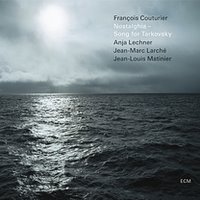
Nostalghia—Song for Tarkovsky
By Francois Couturier
ECM (#1979)
Jazz has always had an uneasy relationship with film. Sometimes jazz artists have found employment scoring films, or have taken inspiration from cinema for thematic albums. The results, of course, vary widely. Nostalghia—Song For Tarkovsky, Francois Couturier’s tribute to the highly regarded Soviet filmmaker who eventually defected in the 1980’s, is particularly effective because of the diverse nature of the influences synthesized into an original whole.
Nostalghia is most likely to be found on jazz shelves, but Couturier’s compositions owe as much to classical music as they do to jazz. The unusual instrumentation including accordion, is also sometimes reminiscent of more traditional folk music. In short, it is a perfect blend for ECM.
As Tarkovsky’s film’s largely eschewed music, Couturier’s tribute consists of entirely original compositions, and three free improvisations. However, his music does capture the spirit of the director’s work. The opening track, “Le Sacrifice,” captures the meditative spirit of the film of the same name, a philosophical reflection on the impending end of the world. It shows Couturier’s patience to let the music un-spool gradually, as his contemplative piano eventually gives way to Jean-Louis Matinier’s accordion. Approximately halfway through, Couturier’s turbulent run on the piano signals a darker mood shift, echoed by Matinier. “Le Sacrifice” is perfectly representative of the session as whole—sometimes introspective, sometimes unsettling, but challenging music performed at a high level.
“Nostalghia,” the title track, also inspired by a film of the same name, is a fine feature for Jean-Marc Larché’s mournful soprano floating over Couturier’s repeated piano figure. The film expresses the alienation of a Russian traveling abroad, and Larché and cellist Anja Lechner express that sense of loneliness, interrupted midway by a pointillistic solo from Couturier.
“Solaris I” and “II” are free improvisations taking their name from Tarkovsky’s science fiction classic. Solaris plays games with the nature of reality and memory, making it a difficult film to summarize. The first improvisation expresses initial foreboding, resolving into melancholy. The second succeeds as a science fiction tone poem conveying the sounds of the space station before returning to the disquieting mood of the first improv.
“Andrei” takes its inspiration from Andrei Rublev, a film based on the life of the Russian artist that was shelved by Soviet authorities for five years after its completion. It features beautiful interplay between Couturier, at times ranging fairly high up the key board, and Matinnier.
“Stalker (for Edouard Artemiev)” takes inspiration from Stalker, another science fiction film which problematizes the notion of reality. Appropriately “Stalker” opens with Couturier’s darkly rhapsodic piano echoed by Lechner’s cello. As piano and cello combine to form a turbulent sea, Larché’s soprano seems to float above it undisturbed.
The deeply personal, pensive nature of Tarkovsky’s films were stylistically at odds with the state preferred Soviet Realism, so his troubles with state film authorities are hardly surprising. Couturier has composed a beautiful tribute to Tarkovsky’s work that rewards repeated listening. He assembled a group of sympathetic musicians who play well with each other and give each other space when appropriate. By turn ominous and elegiac, Nostalghia captures the essence of the filmmaker who inspired it.